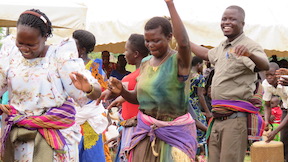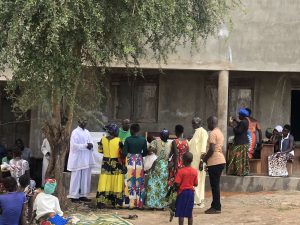Mubaku Educational Foundation
Our mission is to help support the children and their families, along with the staff of the Bright Future School in Mubaku, Uganda. We raise funds to sponsor children, support the educational staff, provide materials and supplies, build and enhance classrooms and educate the adults in the community of Mubaku, Uganda.
– You can change a child’s life for as little as $65 a year –
- $65 a year provides a year of primary education.
- $165 a year provides an education and a safe dorm for young women, orphans and at risk children .
- $400 a year enables a graduate of Bright Future Primary School to attend a secondary boarding school.
- 100% of the funds donated goes to Mubaku Village, Uganda except for PayPal’s processing fee and a $9.00 a month wire fee.
A guiding principle of MEF is that we support the villagers’ decisions on their priorities for Mubaku. The village sets the direction and priorities for the school and the village, and is responsible for execution and operations, while MEF raises funds to support their efforts and ensure the funds have been spent as promised.
Check out MEF’s latest Newsletter.
History of Mubaku Bright Future School
| In 2014, the Mubaku community was in desperate need of a school. They knew there was no government funding available, so it would have to be self-funded. Enough parents signed up to hire the first teacher, and Mubaku Community Conservation Organization (MUCCO) was able to start Bright Future School. The first classes were held under a tree. Initially, they had to stop enrollment at 73 Children as the school only had one teacher. In 2015, the school was able to add two more teachers. Over time, tourists gave the school enough funds to purchase land and build a shade structure.
The Mubaku Education Foundation (MEF) was founded in 2018 to support the children and their families, along with the staff of the Bright Future School in Mubaku, Uganda. In late 2018 and early 2019, fundraising campaigns in the village, Europe, and North America raised enough from 190 donors to build and furnish the first four classrooms, an office, and a storage room. On Sept 8, 2019, the first brick school was dedicated. In July 2021, the second building, containg three nursery classrooms and the women’s empowertment centre, was completed. On September 2023, the dorm for the orphans and at-risk girls and boys was completed. The third school building, containing four primary classrooms, was completed in October 2025. Currently, over 300 donors have enabled the village of Mubaku, Uganda, to build and operate eleven classrooms, a Women’s Empowerment Center (WEC), ensure a safe water supply, and address emergency needs such as repairing the damage from the windstorm of Dec 8, 2020, that damaged the first building. |
MEF – Accomplishments to Date:
First Brick School Building: Finished Sept 2019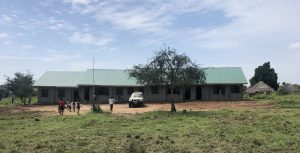 The first brick building contains four primary classrooms, a teacher’s room and a storage room. Also included were a village latrine and a refurbishing of the borehole which provides safe drinking water for the village. Attendance was 135 children in 2018. With the completion of the first building, attendance increased to 205 children. Thanks to the generosity of our donors, 117 children are currently attending on scholarships, 66% of which are girls who otherwise would not be able to attend. Read about the construction process for the first school building |
Nancy Wright Building: Finished July 2021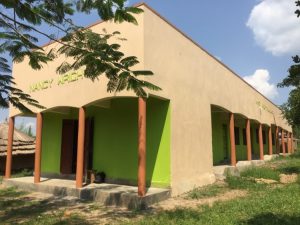 This second building contains three nursery classrooms, a teacher’s room, a storage room, and the Women’s Empowerment Centre The Women’s Empowerment Centre is already enabling women from the village to make and sell clothing and crafts. Attendance is 215 children for 2020 summer term. 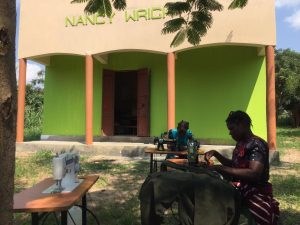 The proceeds from the sales helps support the school and Mubaku women while their children attend the Nursery School. Read about the construction process of the Nancy Wright Building |
Dorm: Finished August 2023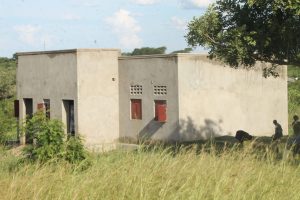 The dorm provides safe housing for the at-risk girls, orphans, and students who travel long distances to school During the pandemic, the village decided to build a dorm for at-risk girls and boys as its next project. The dorm was needed for several reasons, including to ensure the highest level of success and safety for their students. The dorm currently has 72 students and has a maximum capacity of up to 100 boys and up to 100 girls using bunk beds. The matron has separate quarters and there is a guard at night. Read more about the dorm construction process
|
Third Classroom Building: Finished October 2025
The village decided that an additional classroom building was its next greatest need. This gives each grade level its own classroom and provides a library for the school’s growing book collection. The construction cost was $22,400 USD, and the project was completed in October 2025. Read about the construction progress for the Third Classroom Building. |
HERE’S HOW YOU CAN HELP
Sponsor a day student for $65/ year, which will pay their entire school expenses, including uniforms, books, and supplies, and hot lunch daily, … or…
Sponsor an at-risk child or orphan to live in the dorms for $165/ year, which will pay for their housing, clothing, hygiene supplies, meals, and school expenses, including uniforms, books, and supplies,, … or…
Sponsor a graduate of the primary school to attend a secondary boarding school for $400/ year, which will pay for their housing, extra clothing, hygiene supplies, all meals, and school expenses, including uniforms, books, and supplies, and transportation to and from the boarding school, … or…
Sponsor all or part of a teacher’s pay and provide more teaching training. This enables the school to resist the upward pressure on the cost of educating the children, so the yearly costs can stay the same for sponsors and villagers … or…
Contribute what you can to the building or operational fund. Any amount will help.
Schooling in Mubaku, Uganda
There is limited free schooling in Uganda. Government schools are far apart and are poorly staffed, with up to 100 children per class. For Mubaku Village, the nearest school requires the children to walk over an hour through an area with many baboons. Most parents choose to not send their children to school rather than risk them being attacked by the baboons. For that reason, the villagers decided to form their own school.
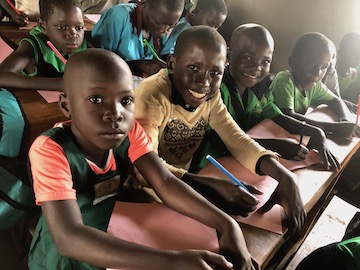 As there is no government support for the school, the entire cost for both building and supporting the school is borne by the villagers, who are mostly subsistence farmers with very little income. For this reason, parents often send only one child from the family, and usually, the girls stay home to help with household duties or get married as young as 13 or 14 years old.
As there is no government support for the school, the entire cost for both building and supporting the school is borne by the villagers, who are mostly subsistence farmers with very little income. For this reason, parents often send only one child from the family, and usually, the girls stay home to help with household duties or get married as young as 13 or 14 years old.
There are two organizations, MUCCO, a Mubaku village-based grassroots group, and MEF, a California-based non-profit, who work together to help realize the dream of building a proper school for the village. Since MEF joined the effort in 2018, we have raise funds to build two four-room classroom buildings for primary students, a three-room nursery school, a dorm, a Women’s Empowerment Center. This was done through an outpouring of love from both visitors and friends – over 300 donors.
In addition, 149 of the 215 students are sponsored for this school year. By providing scholarships, it means that more kids from each family can attend Bright Future School. In just the past years, the enrollment at the school has more than doubled, and the number of girls now attending has increased at a fast rate. Now more girls than boys are attending.
But this is just the beginning. We would also like to ensure that any child who wants to attend school can, even if their parents can’t afford to pay the school fees.
For more information, read the October, 2025 Mubaku Educational Foundation Newsletter #13
COVID-19 Impact.
In March 2020, the Ugandan government ordered all schools closed due to COVID-19. In Jan 2021, schools reopened for grades P5 and higher. On May 17, 2021, all classes except the nursery baby class and middle class resumed. On Jun 7, 2021, Uganda went into a nationwide lockdown due to an increase in COVID-19 deaths, and the school closed again. The school has now reopened.
Uganda has one of the lowest COVID-19 deaths per million rates in the world. This has been accomplished by rapidly shutting everything down when COVID-19 cases start to rise.
A large impact was that the local lodges closed, which eliminated one of the few sources of jobs. Lodges are now reopened and tourists have returned.


